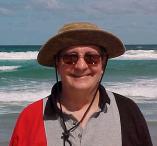
![]()
This timeline of important science events and people was begun on Sunday June 17, 2001 8:50 am Lismore, NSW.
It will be independent of any one source, but all sources used will be identified at the bottom of the table.
June 20, 2001 7:30 am Lismore. I want to provide a framework that embeds the science events within a broad world history context. Thus I will add a few non-science items in red to act as markers. Names will be inserted according to year of birth. Important events within a person's lifetime will be mentioned in the Description. I will also try to find 1-3 web sites that provide more details.
| NAME | DATE | DESCRIPTION |
|
Aristotle |
logic; observation | |
| Leonardo da Vinci | 1452-1519 | observation, anatomy, |
| Copernicus | 1473-1543 | astronomy: sun is center of solar system |
|
Tycho Brache (Denmark) |
1546-1601 | astronomy: careful observation of the planetary orbits |
|
Francis Bacon (England) |
1561-1626 |
philosophy: emphasized observation and the senses, inductive reasoning (arriving at general conclusions from many observations), empiricist "Novum Organum" 1620 |
| Galileo | 1564-1642 | experiment |
|
Johannes Kepler (Germany) |
1571-1630 | astronomy: planets travel in elliptical orbits |
|
Rene Descartes (France) |
1596-1650 |
philosophy: emphasized reason, rationalist mathematics: cartesian geometry united algebra and geometry |
|
Robert Boyle (England |
1627-1691 | chemist |
|
Locke (England) |
1632-1704 |
philosophy "Essay Concerning Human Understanding" 1690 |
|
Isaac Newton (England) |
1642-1727 |
three laws of motion; universal gravitation; calculus; optics "Principia Mathematica" 1686 |
|
Leibniz (France) |
1646-1716 | calculus |
|
Bishop Berkeley (England) |
1685-1753 | philosophy |
|
Voltaire (France) |
1694-1778 | promoted Newton's ideas in France |
|
David Hume (England) |
1711-1776 | philosopher |
|
Denis Diderot (France) |
1713-1784 | "Encyclopedie" (1751-????) |
|
Thomas Paine (England) |
1737-1809 | "The Age of Reason" |
| Henry Cavendish | 1731-1810 | |
|
Charles Coulomb (France) |
1736-1806 | 1785, 1787 published his results formula for the force between electrical charges |
| Alessandro Volta | 1745-1827 | found a way to produce a steady current of electricity 1800 |
|
John Dalton (England) |
1766-1844 | chemist: established the idea of an element |
|
Hans Christian Oersted (Denmark) |
showed that an electric current influenced a compass needle 1820 | |
|
Michael Faraday (England) |
showed the relationship between magnetism and electricity; invented the idea of elecric and magnetic fields | |
|
James Maxwell (Scotland) |
1831-1879 | provided the mathematical equations for Farday's observations |
| Karl Popper | 1902-1995 | philosophy: theories are modified or replaced when a better explanation comes along; theories can be disproved, but never proved. |
| Thomas Kuhn | modern | "Structure of Scientific Revolutions" (1962) idea of research paradigms - established frameworks of thought |
Books:
- Silver, B. L. (1998). The Ascent of Science. New York: Oxford University Press.
Web Sites: